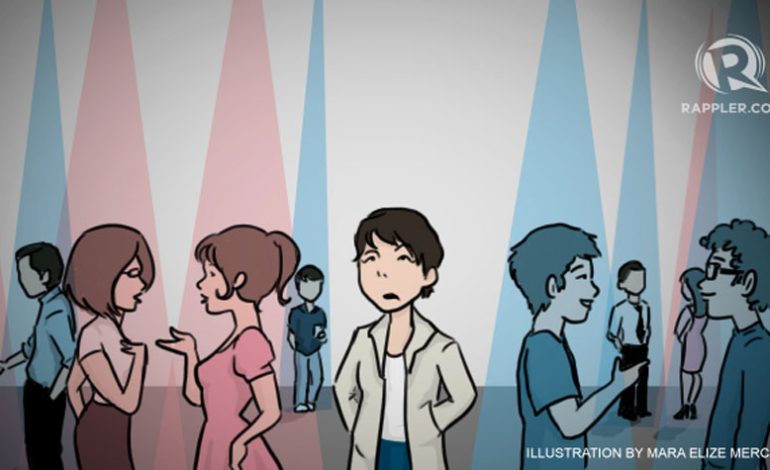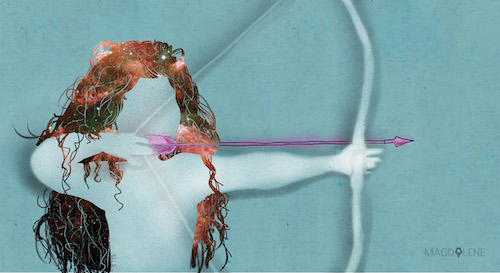Don’t Worry About My Gender

You see me on the street and you’re not sure how to place me. I know she’s a girl, but why the barber cut? She’s pretty, but why the masculine attire?
You see an effeminate man in the public bus, and ask yourself, “Is he gay?” You see two girls holding hands and you say, “Are they a couple?”
Why the need to “place” people or make sense of them? How come we’re never at peace until we can fit them perfectly into a category in our minds? Worse, why the need to make comments about how they look or who they’re with? Why do we need to categorize people as male, female, gay or straight, coupled or single? Why do we need to box them in and label them? Couldn’t we just let them pass us by?
Apparently, this is a common sociological phenomenon. When we see a person, we attempt to speed up the process of knowing them by setting them against roles, norms and physical cues we expect from people. We apply labels, like gay and tomboy, even if we really don’t know what their sexual preference or orientation is, because it helps us come up with assumptions about who they are, thereby “figuring them out.” This is called social categorization, a process known to result in false conclusions as well as perpetuate harmful stereotypes.
We put people in their proper places in our minds to understand them, and sometimes we can’t rest until we do. We’ve been bombarded with these ideas of how things need to be, and these beliefs have been overemphasized in our heads. But these fixed categories in our minds are so reflective of our own restrictions that do not necessarily apply to other people.
Because it doesn’t apply to us, it’s hard to accept that a woman can love another woman, or dress like a man. Why can’t we accept that a man is clean-cut and mild-mannered, or chooses feminine attire? Why? Because we’re afraid that “understanding” a different presentation of our hard-held ideas compromises us? It does not. Understanding the differences among us actually enriches our lives and leads to a more harmonious and tolerant environment.
In sociology, there is such a thing called outgroup homogeneity, where we treat people who do not belong to our in-group (i.e. same race, gender, sexual orientation, or social class as us) as one body of people with identical desires. We’re all guilty of it, like when we believe all Americans are rich or amoral, or that certain races are rude, or smelly, or lazy. This is where dangerous generalizations come in, where we say that all gay men are pedophiles or sex addicts, or all lesbians hate men and are out to steal men’s wives.
Outrageous yet popularized generalizations about certain races, sects, and religions are the root of most wars and genocides. Throughout history, majorities have labeled minorities as different from them, and therefore deserve to be subordinated, oppressed, or exterminated.
Solid gender norms
If one’s principles and gender norms are so strong and infallible, why not bring them up to the light? Why not air them out and open them to discussion so they may be affirmed more?
Next time, get to know that gender-nonconforming person. Make friends with that transgender man. Ask that transgender woman about her family life. You might be surprised that they are human too, with feelings and hopes just like you. You might be surprised that they’re not looking to change your mind, but simply to be left alone.
You see a large-framed woman in the mall and note her big hands. Is she a straight woman or gay? If you’re a little informed, you run through the terminology and try to see what fits. Gay. Transvestite. Transgender. Cross-dresser. Effeminate. For most, the only thing uttered is, “Hey, something’s obvious.”
Obvious what? Why do we insist that transgendered men and women are just pretending, and trying to be who they’re not?
Transgendered people are born aware that they identify as a gender not matching their body, but they might take a while to verbalize it. That doesn’t mean they’re pretending, but simply doing what feels natural and true to themselves, no matter how bothersome it looks to you.
If you call people out to accept what they were born with, how come you never call out that lady with the nose job or the fake breasts even if she wasn’t born with those parts? Because it’s disrespectful and none of your business, right? Maybe it’s time we apply that kind of respect to everyone.
We’re not looking to be understood, or to launch into a discussion of homosexuality and gender issues with you. We simply want to be left alone and to get on with our lives.
So the next time you can’t figure us out, when you’re assessing our breasts and skin, outfits, or various organ sizes, hey – I have a great idea. How about you just run along with a clear mind and tolerant heart, and get on with your own life? Because that’s all we’re trying to do with ours, without being interrupted by your assumptions and convictions about us that might consume you, but simply have no real bearing on your life. Unfortunately, it’s your “harmless” convictions that have a huge impact on our lives.
Shakira Andrea Sison is a Palanca Award-winning essayist. She currently works in finance and spends her non-working hours defying gender norms in subway trains. She is a veterinarian by education and was managing a retail corporation in Manila before relocating to New York in 2002. Her column appears on Thursdays. Follow her on Twitter: @shakirasison and on Facebook.com/sisonshakira.
This article was first published by Rappler.com, a Manila-based social news network where stories inspire community engagement and digitally fuelled actions for social change.






















